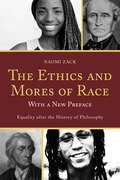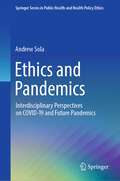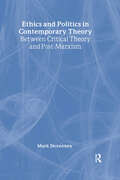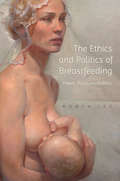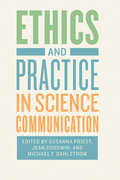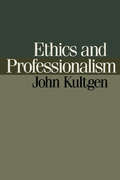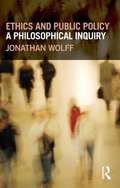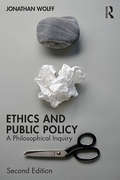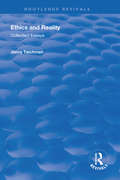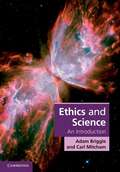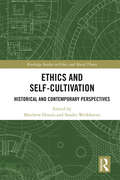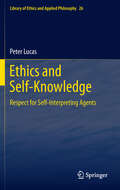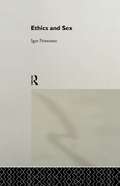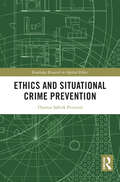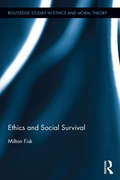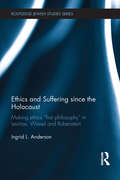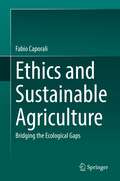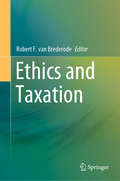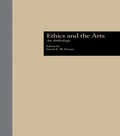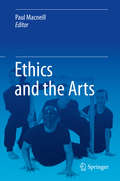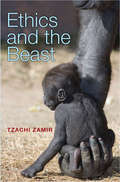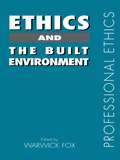- Table View
- List View
The Ethics and Mores of Race: Equality after the History of Philosophy
by Naomi Zack<p>Preeminent philosopher, Naomi Zack, brings us an indispensable work in the ethics of race through an inquiry into the history of moral philosophy. Beginning with Plato and a philosophical tradition that has largely ignored race, The Ethics and Mores of Race: Equality after the History of Philosophy enters into a web of ideas, ethics, and morals that untangle our evolving ideas of racial equality straight into the twenty-first century. The dichotomy between ethics and mores has long aided the separation of what is right with ideas of equality. Zack tackles the co-existence of slavery with the classic moral systems and continues to show how our society has evolved and our mores with it. An ethics of race may not exist yet, but this book gives us twelve discerning requirements to establish it. <p>In the preface to the paperback edition, Zack addresses the criticisms raised in response to this book and concludes that a focus on rights and justice, rather than privilege, is the only fruitful pathway towards a functioning ethics of race. </p>
Ethics and Pandemics: Interdisciplinary Perspectives on COVID-19 and Future Pandemics (Springer Series in Public Health and Health Policy Ethics)
by Andrew SolaThis book is for readers who wish to understand the ethical implications of the COVID-19 pandemic — holistically — on communities, politics, the economy, the environment, international relations, public health, and, most importantly, on their own lives and their own futures. It also helps readers to think through the wide-ranging ethical implications of the new age of global pandemics. The COVID-19 pandemic has transformed all of our lives to such an extent that no single publication will ever be able to capture its complexity. The book acknowledges this complexity by embracing interdisciplinary dialogue. It is open to diverse points of view, different ethical systems, and a wide variety of academic disciplines. It suggests three broad avenues to exploring the subject: Ethics for Pandemics: What ethical theories are useful for pandemic living?Ethics in Pandemics: How are long-standing ethical dilemmas revealed in pandemics? Ethics of Pandemics: How should politicians and public health professionals create ethical systems of pandemic management? Interdisciplinary perspectives are another key feature of the book and reflect the important insights that many academic disciplines — medical ethics and public health, history, political science, economics, behavioral and evolutionary psychology, and climate science — bring to bear on the subject. In the chapters, the author joins theory and practice, providing an overview of the major ethical theories: Kant and DeontologyUtilitarianism and Consequentialist EthicsSocial Contract TheoryEgoism and AltruismVirtue Ethics It then uses these theories to analyze both COVID-19 and also historical pandemics, including typhus, smallpox, the Black Death, HIV/AIDS, and polio. Ethics and Pandemics: Interdisciplinary Perspectives on COVID-19 and Future Pandemics prepares readers to better understand ethical living during times of crisis. While written for students pursuing any discipline, it is particularly suited for those seeking degrees in public health, health care, political science, and philosophy. Furthermore, non-specialized readers and members of the general public will find the book of interest.
Ethics and Philosophical Critique in William James
by Sarin MarchettiMarchetti offers a revisionist account of James's contribution to moral thought in the light of his pragmatic conception of philosophical activity. He sketches a composite picture of a Jamesian approach to ethics revolving around the key notion and practice of a therapeutic critique of one's ordinary moral convictions and style of moral reasoning.
Ethics and Philosophical Critique in William James
by Sarin MarchettiMarchetti offers a revisionist account of James's contribution to moral thought in the light of his pragmatic conception of philosophical activity. He sketches a composite picture of a Jamesian approach to ethics revolving around the key notion and practice of a therapeutic critique of one's ordinary moral convictions and style of moral reasoning.
Ethics and Politics in Contemporary Theory Between Critical Theory and Post-Marxism (Routledge Innovations in Political Theory #Vol. 4)
by Mark DevenneyIn addressing the political and theoretical debates between critical and post-Marxist theorists, this book discusses the politics of communication and rationality, subjectivity, sovereignty, ethics and deliberative democracy, considering questions such as:* Does the theory of communicative action justify deliberative democracy?* Is a theory of hegemony compatible with an account which relies upon an ideal of communicative success?* Is autonomy a good which should be fostered?* Can the ideal of democracy extend beyond the nation state?* Does post-Marxism have anything interesting to say about ethics?Analysing the work of Ernesto Laclau and Jürgen Habermas - as representatives of different choices made in regard to theory, politics and morality - Ethics and Politics in Contemporary Theory develops a critical response to the contrasting conclusions of these approaches.
The Ethics and Politics of Breastfeeding: Power, Pleasure, Poetics
by Robyn LeeResponding to the most widely read breastfeeding manual, La Leche League’s The Womanly Art of Breastfeeding, Robyn Lee’s The Ethics and Politics of Breastfeeding explores breastfeeding as an art that must be developed through skillful application of effort and distinguished from a merely natural or physiological process. The Ethics and Politics of Breastfeeding challenges the dominant understanding of breastfeeding and cultivates an alternative conception as an ethical, embodied practice of the self. Drawing on the work of Michel Foucault, Emmanuel Levinas, and Luce Irigaray, Lee develops a new understanding of breastfeeding as an "art of living," where the practice is reconsidered in the light of ongoing social inequalities.
Ethics and Practice in Science Communication
by Susanna Priest Jean Goodwin Michael F. DahlstromFrom climate to vaccination, stem-cell research to evolution, scientific work is often the subject of public controversies in which scientists and science communicators find themselves enmeshed. Especially with such hot-button topics, science communication plays vital roles. Gathering together the work of a multidisciplinary, international collection of scholars, the editors of Ethics and Practice in Science Communication present an enlightening dialogue involving these communities, one that articulates the often differing objectives and ethical responsibilities communicators face in bringing a range of scientific knowledge to the wider world. In three sections—how ethics matters, professional practice, and case studies—contributors to this volume explore the many complex questions surrounding the communication of scientific results to nonscientists. Has the science been shared clearly and accurately? Have questions of risk, uncertainty, and appropriate representation been adequately addressed? And, most fundamentally, what is the purpose of communicating science to the public: Is it to inform and empower? Or to persuade—to influence behavior and policy? By inspiring scientists and science communicators alike to think more deeply about their work, this book reaffirms that the integrity of the communication of science is vital to a healthy relationship between science and society today.
Ethics and Professionalism
by John KultgenJohn Kultgen explores the ways morality and professional ideals are connected. In assessing the moral impact of professionalism in our society, he examines both the structure and organization of occupations and the ideals and ideology associated with professions.Differing from standard treatments of professional ethics, Ethics and Professionalism recognizes that it is the practices within the professions that determine whether rules and ideals are used as masks for self-interest or for genuinely moral purposes.
Ethics and Public Policy: A Philosophical Inquiry
by Jonathan WolffEthics and Public Policy: A Philosophical Inquiry is the first book to subject important and controversial areas of public policy to philosophical scrutiny. Jonathan Wolff, a renowned philosopher and veteran of many public committees, such as the Gambling Review Body, introduces and assesses core problems and controversies in public policy from a philosophical standpoint. Each chapter is centred on an important area of public policy where there is considerable moral and political disagreement.
Ethics and Public Policy: A Philosophical Inquiry
by Jonathan WolffTrain crashes cause, on average, a handful of deaths each year in the UK. Technologies exist that would save the lives of some of those who die. Yet these technical innovations would cost hundreds of millions of pounds. Should we spend the money? How can we decide how to trade off life against financial cost? Such dilemmas make public policy is a battlefield of values, yet all too often we let technical experts decide the issues for us. Can philosophy help us make better decisions? Ethics and Public Policy: A Philosophical Inquiry is the first book to subject important and controversial areas of public policy to philosophical scrutiny. Jonathan Wolff, a renowned philosopher and veteran of many public committees, such as the Gambling Review Body, introduces and assesses core problems and controversies in public policy from a philosophical standpoint. Each chapter is centred on an important area of public policy where there is considerable moral and political disagreement. Topics discussed include: Can we defend inflicting suffering on animals in scientific experiments for human benefit? What limits to gambling can be achieved through legislation? What assumptions underlie drug policy? Can we justify punishing those who engage in actions that harm only themselves? What is so bad about crime? What is the point of punishment? Other chapters discuss health care, disability, safety and the free market. Throughout the book, fundamental questions for both philosopher and policy maker recur: what are the best methods for connecting philosophy and public policy? Should thinking about public policy be guided by an 'an ideal world' or the world we live in now? If there are 'knock down' arguments in philosophy why are there none in public policy? Each chapter concludes with 'Lessons for Philosophy' making this book not only an ideal introduction for those coming to philosophy, ethics or public policy for the first time, but also a vital resource for anyone grappling with the moral complexity underlying policy debates.
Ethics and Public Policy: A Philosophical Inquiry
by Jonathan WolffEthics and Public Policy: A Philosophical Inquiry, second edition subjects important and controversial areas of public policy to philosophical scrutiny. Jonathan Wolff, a renowned philosopher and veteran of many public committees, introduces and assesses core problems and controversies in public policy from a philosophical standpoint. Each chapter focuses on an important area of public policy where there is considerable moral and political disagreement. Topics discussed include: • Can we defend inflicting suffering on animals in scientific experiments for human benefit? • What limits to gambling can be achieved through legislation? • What assumptions underlie drug policy? Can we justify punishing those who engage in actions that harm only themselves? • What is so bad about crime? What is the point of punishment? Other chapters discuss health care, disability, safety, and the free market. Throughout the book, fundamental questions for both philosopher and policy maker recur: what are the best methods for connecting philosophy and public policy? Should thinking about public policy be guided by an ‘an ideal world’ or the world we live in now? If there are ‘knock down’ arguments in philosophy why are there none in public policy? Revised throughout to reflect changes in policy and research, this second edition includes four new chapters, on risky new technologies, the future of work, poverty, and immigration. Each chapter concludes with ‘Lessons for Philosophy’ making this book not only an ideal introduction for those coming to philosophy, ethics, or public policy for the first time, but also a vital resource for anyone grappling with the moral complexity underlying policy debates.
Ethics and Reality: Collected Essays (Routledge Revivals)
by Jenny TeichmanPublished in 2001, Ethics and Reality presents a new collection of Jenny Teichman's most important essays across a wide spectrum of ethical issues. Teichman explores a range of human problems including: war and peace, tyranny and terrorism, sex and gender and life and death. Focusing particularly on philosophical scepticism and reality, Teichman argues that if scepticism is irrefutable then ethical reasoning has no connection with reality and what look like genuine human dilemmas must be purely imaginary. The essays in the first part of this book are intended to show that scepticism can be rebutted; those in the second and third sections exemplify the application of moral reasoning to inescapable quandaries.
Ethics and Science
by Carl Mitcham Adam BriggleWho owns your genes? What does climate science imply for policy? Do corporations conduct honest research? Should we teach intelligent design? Humans are creating a new world through science. The kind of world we are creating will not simply be decided by expanding scientific knowledge, but will depend on views about good and bad, right and wrong. These visions, in turn, depend on critical thinking, cogent argument and informed judgement. In this book, Adam Briggle and Carl Mitcham help readers to cultivate these skills. They first introduce ethics and the normative structure of science and then consider the 'society of science' and its norms for the responsible conduct of research and the treatment of human and animal research subjects. Later chapters examine 'science in society' - exploring ethical issues at the interfaces of science, policy, religion, culture and technology. Each chapter features case studies and research questions to stimulate further reflection.
Ethics and Self-Cultivation: Historical and Contemporary Perspectives (Routledge Studies in Ethics and Moral Theory)
by Matthew Dennis Sander WerkhovenThe aim of Ethics and Self-Cultivation is to establish and explore a new ‘cultivation of the self’ strand within contemporary moral philosophy. Although the revival of virtue ethics has helped reintroduce the eudaimonic tradition into mainstream philosophical debates, it has by and large been a revival of Aristotelian ethics combined with a modern preoccupation with standards for the moral rightness of actions. The essays comprising this volume offer a fresh approach to the eudaimonic tradition: instead of conditions for rightness of actions, it focuses on conceptions of human life that are best for the one living it. The first section of essays looks at the Hellenistic schools and the way they influenced modern thinkers like Spinoza, Kant, Nietzsche, Hadot, and Foucault in their thinking about self-cultivation. The second section offers contemporary perspectives on ethical self-cultivation by drawing on work in moral psychology, epistemology of self-knowledge, philosophy of mind, and meta-ethics.
Ethics and Self-Knowledge
by Peter LucasThis book explores the theoretical basis of our ethical obligations to others as self-knowing beings - this task being envisaged as an essential supplement to a traditional ethic of respect for persons. Authoritative knowledge of others brings with it certain obligations, which are reflected in (inter alia) the moral and legal safeguards designed to ensure that certain information is 'put out of play' for job selection purposes etc. However, the theoretical basis for such obligations has never been fully clarified. This book begins by identifying a distinctive class of 'interpretive' moral wrongs (including stereotyping, discrimination and objectification). It then shows how our obligations in respect of these wrongs can be understood, drawing on insights from the tradition of philosophical reflection on recognition. The book will be of interest to anyone concerned with the adequacy of a modern ethic of respect for persons - particularly in applied and professional ethics.
Ethics and Sex
by Igor PrimoratzEthics and Sex presents a systematic study of the nature and moral significance of human sexuality and of the major issues in sexual morality.The book is divided into two main parts. Part One gives a critical analysis of the key conceptions of human sexuality. Part Two discusses the most important issues in sexual morality: monogamy; adultery; prostitution; homosexuality; paedophilia; sexual harassment and rape.In this controversial and accessible book, the author demonstrates that many of the prohibitions that make up conventional sexual morality cannot withstand critical scrutiny.
Ethics and Situational Crime Prevention (Routledge Research in Applied Ethics)
by Thomas Søbirk PetersenThis book addresses the ethics of Situational Crime Prevention (SCP). It seeks not only to analyse specific SCP measures but to demonstrate how ethical analysis can support and improve the implementation of SCP strategies.In ethically analysing a particular SCP measure, it is not enough to look at empirical data. Even if a measure is effective at preventing crime, it may turn out to be ethically unattractive because it harms more people than it benefits, or because it violates our right to free movement. The book proceeds from the assumption that decision-making about whether we should use SCPs can only be conducted by carefully identifying, clarifying, and critically evaluating the ethical arguments for and against use of the SCP measure in question. The author analyses several SCP strategies that have not been treated in detail in criminology or applied ethics literatures. These SCP strategies include gated communities, excluding people with a criminal record from housing or employment, the use of hostile design in public spaces, and the implementation of intelligent speed adaption in vehicles.Ethics and Situational Crime Prevention is an essential resource for criminologists, moral philosophers, legal scholars, and social scientists with an interest in crime prevention.
Ethics and Social Survival (Routledge Studies in Ethics and Moral Theory)
by Milton FiskWhen speaking of society’s role in ethics, one tends to think of society as regimenting people through its customs. Ethics and Social Survival rejects theories that treat ethics as having justification within itself and contends that ethics can have a grip on humans only if it serves their deep-seated need to live together. It takes a social-survival view of ethical life and its norms by arguing that ethics looks to society not for regimentation by customs, but rather for the viability of society. Fisk traces this theme through the work of various philosophers and builds a consideration of social divisions to show how rationalists fail to realize their aim of justifying ethical norms across divisions. The book also explores the relation of power and authority to ethics—without simply dismissing them as impediments—and explains how personal values such as honesty, modesty, and self-esteem still retain ethical importance. Finally, it shows that basing ethics on avoiding social collapse helps support familiar norms of liberty, justice, and democracy, and strives to connect global and local ethics.
Ethics and Suffering since the Holocaust: Making Ethics "First Philosophy" in Levinas, Wiesel and Rubenstein (Routledge Jewish Studies Series)
by Ingrid L AndersonFor many, the Holocaust made thinking about ethics in traditional ways impossible. It called into question the predominance of speculative ontology in Western thought, and left many arguing that Western political, cultural and philosophical inattention to universal ethics were both a cause and an effect of European civilization's collapse in the twentieth century. Emmanuel Levinas, Elie Wiesel and Richard Rubenstein respond to this problem by insisting that ethics must be Western thought's first concern. Unlike previous thinkers, they locate humanity's source of universal ethical obligation in the temporal world of experience, where human suffering, rather than metaphysics, provides the ground for ethical engagement. All three thinkers contend that Judaism’s key lesson is that our fellow human is our responsibility, and use Judaism to develop a contemporary ethics that could operate with or without God. Ethics and Suffering since the Holocaust explores selected works of Levinas, Wiesel, and Rubenstein for practical applications of their ethics, analyzing the role of suffering and examining the use each thinker makes of Jewish sources and the advantages and disadvantages of this use. Finally, it suggests how the work of Jewish thinkers living in the wake of the Holocaust can be of unique value to those interested in the problem of ethics in the twentieth and twenty-first centuries. Presenting a thorough investigation of the work of Levinas, Wiesel and Rubinstein, this book is of key interest to students and scholars of Jewish studies, as well as Jewish ethics and philosophy.
Ethics and Sustainable Agriculture: Bridging the Ecological Gaps
by Fabio CaporaliThis book describes the alarming condition of agriculture in the Anthropocene, when the ethical conception of agriculture as a service of common utility for both society and environment has progressively been marginalized. The ethical utility of agriculture has been sidetracked with the increasing industrialisation of society, the involvement of agriculture in the business-as-usual economy, and the consequential environmental and societal impacts it has had. Thus, re-establishing a meaningful bridge between ethics and agriculture is necessary. A relatively new science (ecology) with both a new epistemological tool (that of the ecosystem concept), and a unique narrative of sustainable development, can help bridge this gap. This book focuses on ethics as a lever for raising scientific, technical, social, economic and political solutions to adopt in agriculture as a model of symbiotic relationships between man and nature. It provides a detailed discussion of the ecological intensification practices in order to maximize ecological and ethical services, wherein agroecosystems will follow.
Ethics and Taxation
by Robert F. van BrederodeThis book does not present a single philosophical approach to taxation and ethics, but instead demonstrates the divergence in opinions and approaches using a framework consisting of three broad categories: tax policy and design of tax law; ethical standards for tax advisors and taxpayers; and tax law enforcement. In turn, the book addresses a number of moral questions in connection with taxes, concerning such topics as: • the nature of government • the relation between government (the state) and its subjects or citizens • the moral justification of taxes• the link between property and taxation• tax planning, evasion and avoidance • corporate social responsibility• the use of coercive power in collecting taxes and enforcing tax laws • ethical standards for tax advisors • tax payer rights • the balance between individual rights to liberty and privacy, and government compliance and information requirements • the moral justification underlying the efforts of legislators and policymakers to restructure society and steer individual and corporate behavior.
Ethics and the Arts: An Anthology
by David E. W. FennerFirst published in 1996. Routledge is an imprint of Taylor & Francis, an informa company.
Ethics and the Arts
by Paul MacneillThis book proposes that the highest expression of ethics is an aesthetic. It suggests that the quintessential performance of any field of practice is an art that captures an ethic beyond any literal statement of values. This is to advocate for a shift in emphasis, away from current juridical approaches to ethics (ethical codes or regulation), toward ethics as an aesthetic practice--away from ethics as a minimal requirement, toward ethics as an aspiration. The book explores the relationship between art and ethics: a subject that has fascinated philosophers from ancient Greece to the present. It explores this relationship in all the arts: literature, the visual arts, film, the performing arts, and music. It also examines current issues raised by 'hybrid' artists who are working at the ambiguous intersections between art, bio art and bioethics and challenging ethical limits in working with living materials. In considering these issues the book investigates the potential for art and ethics to be mutually challenged and changed in this meeting. The book is aimed at artists and students of the arts, who may be interested in approaching ethics and the arts in a new way. It is also aimed at students and teachers of ethics and philosophy, as well as those working in bioethics and the health professions. It will have appeal to the 'general educated reader' as being current, of considerable interest, and offering a perspective on ethics that goes beyond a professional context to include questions about how one approaches ethics in one's own life and practices.
Ethics and the Beast: A Speciesist Argument for Animal Liberation
by Tzachi ZamirMany people think that animal liberation would require a fundamental transformation of basic beliefs. We would have to give up "speciesism" and start viewing animals as our equals, with rights and moral status. And we would have to apply these beliefs in an all-or-nothing way. But in Ethics and the Beast, Tzachi Zamir makes the radical argument that animal liberation doesn't require such radical arguments--and that liberation could be accomplished in a flexible and pragmatic way. By making a case for liberation that is based primarily on common moral intuitions and beliefs, and that therefore could attract wide understanding and support, Zamir attempts to change the terms of the liberation debate. Without defending it, Ethics and the Beast claims that speciesism is fully compatible with liberation. Even if we believe that we should favor humans when there is a pressing human need at stake, Zamir argues, that does not mean that we should allow marginal human interests to trump the life-or-death interests of animals. As minimalist as it sounds, this position generates a robust liberation program, including commitments not to eat animals, subject them to factory farming, or use them in medical research. Zamir also applies his arguments to some questions that tend to be overlooked in the liberation debate, such as whether using animals can be distinguished from exploiting them, whether liberationists should be moral vegetarians or vegans, and whether using animals for therapeutic purposes is morally blameless.
Ethics and the Built Environment: Human Relationships, Nature, And The Built Environment (Professional Ethics)
by Warwick FoxMuch has been written in recent years on environmental ethics relating to the more general 'natural' environment but little specifically written about ethics of the built environment. Ethics and the Built Environment responds to this need and offers a debate on the ethical dimension of building in all its forms from a variety of disciplinary perspectives and approaches.This book should be of interest to architects, students of building and building design, environmentalists, politicians and general readers with an interest in ethics.
